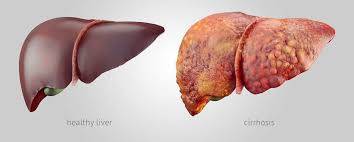Liver cancer, also known as hepatocellular carcinoma, is a serious condition. Here are 20 causes, signs and symptoms, effects, and solutions related to liver cancer:
**Causes:**
1. Chronic viral hepatitis (hepatitis B or C).
2. Cirrhosis of the liver.
3. Excessive alcohol consumption.
4. Non-alcoholic fatty liver disease (NAFLD).
5. Non-alcoholic steatohepatitis (NASH).
6. Hemochromatosis (iron overload disorder).
7. Wilson's disease (copper buildup).
8. Aflatoxin exposure (a toxin produced by certain molds on peanuts and corn).
9. Type 2 diabetes.
10. Smoking tobacco.
11. Family history of liver cancer.
12. Exposure to certain chemicals and toxins.
13. Obesity.
14. Excessive intake of alcohol.
15. Certain genetic conditions.
16. Cirrhosis due to primary biliary cholangitis.
17. Exposure to vinyl chloride (used in plastics manufacturing).
18. Certain herbal supplements.
19. Chronic exposure to anabolic steroids.
20. Radiation therapy for other cancers.
**Signs and Symptoms:**
1. Jaundice (yellowing of the skin and eyes).
2. Abdominal pain or discomfort.
3. Unexplained weight loss.
4. Loss of appetite.
5. Fatigue and weakness.
6. Nausea and vomiting.
7. Enlargement of the liver.
8. Swelling in the abdomen (ascites).
9. Pale-colored stools.
10. Dark urine.
11. Itchy skin (pruritus).
12. Blood clotting problems.
13. Spider-like blood vessels on the skin (spider angiomas).
14. Enlarged spleen (splenomegaly).
15. Cognitive changes (hepatic encephalopathy).
16. Gastrointestinal bleeding.
17. High blood pressure in the liver's blood vessels (portal hypertension).
18. Abdominal fullness.
19. Enlarged breasts in men (gynecomastia).
20. Pain in the right shoulder blade.
**Effects:**
1. Impairment of liver function.
2. Spread of cancer to other organs.
3. Portal hypertension.
4. Gastrointestinal bleeding.
5. Ascites (fluid buildup in the abdomen).
6. Encephalopathy (cognitive changes).
7. Malnutrition and weight loss.
8. Kidney problems.
9. Metabolic complications, including diabetes.
10. Cardiovascular disease.
11. Bone health issues.
12. Hormonal imbalances.
13. Psychological and cognitive issues.
14. Reduced quality of life.
15. Pain and discomfort.
16. Increased healthcare costs.
17. Increased risk of complications during surgery.
18. Social and relationship problems.
19. Risk of bleeding disorders.
20. Increased risk of premature death.
**Solutions:**
1. Early detection through regular screening for high-risk individuals.
2. Treatment of underlying causes (e.g., hepatitis management, alcohol cessation).
3. Liver transplantation in certain cases.
4. Surgery to remove the tumor.
5. Chemotherapy and targeted therapy.
6. Radiation therapy.
7. Radiofrequency ablation.
8. Immunotherapy.
9. Supportive care for managing symptoms and side effects.
10. Nutritional support.
11. Lifestyle changes, including a healthy diet and exercise.
12. Smoking cessation.
13. Managing coagulation problems.
14. Bone health management.
15. Psychological support and counseling.
16. Support from family and friends.
17. Support groups for cancer patients.
18. Public health initiatives to promote awareness and prevention.
19. Educational programs on liver health.
20. Legal regulations and policies to reduce exposure to environmental toxins.
Early diagnosis and prompt treatment are crucial for improving the prognosis of liver cancer. If you suspect you have liver cancer or are at risk, consult a healthcare professional for evaluation and guidance.



No comments yet
Be the first to share your thoughts!